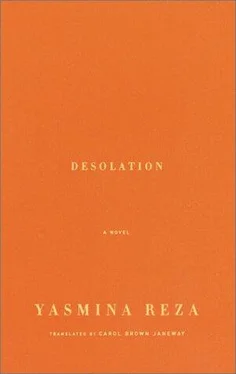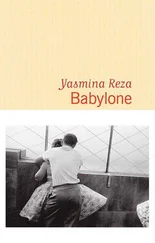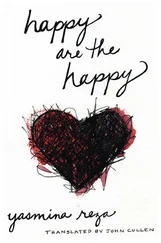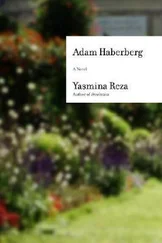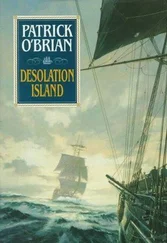Your sister wants to cultivate me. Odd the way women these days create missions for themselves. She maintains the only thing that interests me is music. True. What’s more, to be frank, I can’t see the point of the rest. When music takes possession of you, when music fills your life, will you please tell me what’s the point of words, even nice ones, what’s the point of stories, what’s the use of all that imitating life on paper that people are so wild about, and that shows the effort that went into it and the dexterity, and gives you so little sense of inevitability. Your sister told me I’d be less dense if I read. Word for word. I didn’t get angry. I’m not upset about being dense. Read what, my sweet? Get to know a little literature, you don’t know a thing, you’ve got the time for it now. Instead of saying the exact opposite, which would have been the only possible way to get me interested in the subject, but her ignorance of who I am is bottomless, you have the time now, she says, instead of saying now, Papa, now that you’ve no time anymore.
Most of the people I meet, including my daughter, have only the most trivial grasp of time.
Nancy has developed literary pretensions too. More precisely, since I do have to admit she’s a woman I’ve always seen with a book in her hand, pretty much, Nancy has suddenly been captivated by a writer: André Petit-Pautre (you can easily guess what temptations this name sets off in me). You don’t know him. Nobody knows him. Except for me, because she sometimes invites him to dinner with his wife. Petit-Pautre is her mentor. And our guest, from now on. I remarked that in a world where everyone writes, it’s no surprise that André Petit-Pautre writes too. The other day Lionel quoted me that wonderful thing Enesco said about Bach: the soul of my soul. I said to Lionel, who’s always loved both books and music, “Can you name a simple text that has been the soul of your soul?”
“No. Words can’t reach that high. And the soul doesn’t read.”
I went back to Chopin. I could almost say I took him up for the first time, because I had hated him so much for so many years. Aside from a few moments of Romantic absentmindedness in my youth, I’ve always loathed Chopin. And I went back to him thanks to Samson François, a guy I’ve never been able to listen to either before now, because of his name. Samson, okay, but François! Samson Apfelbaum, absolutely, but not Samson François. Stuck in traffic, I turn on classical radio: “Nocturne.” I leave it on. It’s beautiful. Here you are, sinking back down to Chopin in your old age, bravo, I say to myself. Who’s the pianist? Samson François. Yet another surrender. What do you want, I don’t care that much anymore.
Your sister who is intent on my achieving cultivation asked me if I’d been to the Picasso museum. I told her that not only had I never gone to the Picasso museum but I never would go to the Picasso museum. There’s too much enthusiasm about him, I said. I hate the enthusiasm of the masses for beauty. Generally speaking, all these people who haunt exhibitions and plod around for hours on end revolt me. Your sister, who’s never had a trace of humor or detachment and hasn’t acquired them from her husband either, though I forgive him because he’s a pharmacist and at least I can discuss medicines with him, shrugs her shoulders and asks me with secret sorrow how I spend my days. I think, I tell her, about the absurdity of human effort. You educate people and when you’re finally coming down the home stretch what you have to listen to is them proselytizing for literature and the Picasso museum. That’s how I spend my days, I tell her emphatically, in these sorts of meditations. “You’re interested in politics,” says Nancy. “He’s always very interested in politics,” says poor Nancy, making nice, because my being described as dense has upset her and she’s not trying to come to my assistance but she does want to rehabilitate herself as a wife. “You’re mistaken, dear,” I’m obliged to correct her. “I’m interested in events around the planet the way Lionel watches cars and people passing from his window. Which is to say indifferent to everything except the movement.” Lumping them together, what never changes about these women is that they never believe me. They take everything I say as a series of pathetic and inappropriate poses. Which encourages me to the worst extremes. I think that by the end of the day, I’ve asserted, talking about Jerome — oh, yes, Jerome, there’s another example, yes, he’s my grandson but after all he’s only two and a half and sometimes I call him Jeremy or Thomas, which doesn’t mean a thing, I hear perfectly well but I just don’t hang on to Jerome as his name, your sister takes this as an unforgivable provocation, she doesn’t imagine for a second that I could have forgotten the child’s name — so, talking about Jerome, I’ve said what I think, following on from what had become an extended conversation, which is that I’d prefer him to become a tyrant rather than some card-carrying union faggot. Sounds of horrified clucking, and then to close off any recurrence of Dacimiento as a subject of discussion, I state that the only worthwhile system is feudalism, which had the merit of producing either midgets who kept their mouths shut — and didn’t go around driving us nuts with the Picasso museum and other cultural flab — or knights and revolutionaries, epic types who wielded the sword and the lance. These days we get placards and balloons and women like you who sing. Me personally, I said again, I prefer people screaming and out for blood, waving pikes. At least they make an impression. “Does getting old involve becoming a caricature of yourself?” your sister interjects to show off her cunning and demonstrate that she’s my equal by insulting me. A few years ago I would have slapped her for less. What do you know about aging, you poor creature, how do you even dare use the word after having the complacency to add to humanity by producing a supplementary Jerome. “Getting old,” I said with some restraint, “means to be done with compassion.”
I finished Sunday overcome by loneliness and despair. I’ve always imagined despair to be linked to a particular view of life. Today I discover a despair that is independent of time.
Explain to me the word happiness. I’m willing to believe there’s a part of one’s being that provides for it.
I’ve caught a glimpse of it.
Death is in us. It gradually gains ground. Little by little, everything dissolves and becomes the same. My child, after a certain age, everything is the same as everything else and there’s nothing that serves as a goal anymore. And if God, for which I thank Him, hadn’t given me such a horror of boredom, I could end up like those old dullards you see sitting on public benches contemplating the victory of time.
At the garden show at Longchamp I hear someone say my name. Some unknown woman is smiling at me. Genevieve, she says. Genevieve Abramowitz. She looks like a little tortoise in her summer dress, short hair, eyes still pretty behind her glasses. Genevieve Abramowitz who was once the grand passion of Leo Fench. “I wouldn’t have expected to meet you here,” she says, “after all these years.”
We look at each other for a moment, unable to find the right words. “I didn’t know you were interested in gardening.”
“I’ve always had a thing for flowers. I have a house now.”
I look at this little lady with her helmet of white hair pulling a little plant wagon full of gardenias and I think of Leo under the earth in Montparnasse cemetery. “And you?” I say.
“I have a pretense at a balcony that I keep spruced up. It gives me something to do.”
She says it gives me something to do and smiles apologetically. Immediately I think, me too, it gives me something to do, what else is going on here but me giving myself something to do, the two of us are giving ourselves something to do, citizens henceforth of a world in which desire no longer exists. A world in which compost and gardenias have replaced our possibilities of becoming something more. Compost, gardenias, guaranteed exchange rates, little deals here and there, playing the stock market, and getting sick become a substitute for living. A world without a Promised Land, without burns, without victories and defeats, a world where impatience has become terminally beside the point.
Читать дальше
